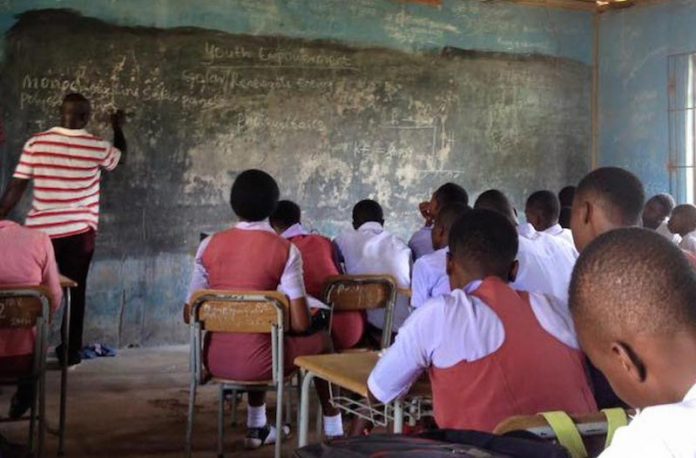The educational system in Nigeria is in a state of monumental crisis. The ruling class has never given public education at any level the priority it demands. Gross underfunding, corruption and high-handedness of those in charge within the educational institutions and ministries of education have become hallmarks of a deeply rotten system.
The rot did not start today, but it has gotten worse. Since Independence, the budgetary allocation to education has never come up to the 15% to 20% recommended by the United Nations Educational, Scientific and Cultural Organization (UNESCO). In fact, it has never been up to 13%. And even a significant amount of the monies released end up in the pockets of heads of institutions and top high-earning bureaucrats in the ministries of education.
Some progress was made in the 1960s/70s, and there was fightback when degeneration of the system began in earnest. There were significant commitments to education in the first two national development plans. This was the period when universal public education was put in place and most of the federal universities were established.
But even then, government did not pay adequate attention to public education. This led to the first strike of university lecturers. The National Association of University Teachers (NAUT) went on strike in 1974 to demand increased funding of education and improved working conditions for federal universities teachers.
More persons attended universities in the first fifteen years of independence than the number of people who attended universities throughout the entire colonial period. Meals for students were subsidized in the tertiary institutions.
When meal tickets were raised from N1.50 to N2.00 by the General Olusegun Obasanjo regime in 1978, the National Union of Nigerian Students (NUNS) organized a massive nationwide protest. Students were killed on several campuses, NUNS was banned, and radical university teachers were sacked.
With the introduction of the Structural Adjustment Program (SAP) formulated by the Bretton Woods Institutions (IMF and World Bank) the idea has been promoted that it is not the business of government to do business. As such the free-market ideology driving deregulation and privatization policies has guided government programmes, including in the education sector. That is why the federal government passed a law in 1993 enabling the establishment of private universities.
This was after the IMF had pushed for the rationalisation (i.e., cancellation) of several courses in the universities, as part of conditionalities of a loan to the federal government in 1990. Countries like Nigeria, they told us, should concentrate on basic technical education at the tertiary level.
But private universities could run humanities and arts courses for the children of the rich! Once again, there was stiff resistance to the IMF conditionality by the National Association of Nigerian Students (NANS).
The impact of these attacks on public education did not take long to start showing itself. By the end of the 1980s, Nigeria had the lowest number of indigenous engineers per capita of any developing country.
The crisis today has now deepened. According to the United Nations International Children Fund (UNICEF), one in every five of the world’s out-of-school children is in Nigeria. But despite this horrible record, the 2021 budget allocates just 5.6% to education.
The regime is following a trend. The preceding PDP administration was no better. Since the return to civil rule in 1999, the state of all three tiers of education has deteriorated exceedingly. The Olusegun Obasanjo-led administration promoted the building of private universities, as did the Goodluck Jonathan government.
Most of these private schools produce 1st class graduates, many of whom cannot defend their qualifications. Sometime in 2015 there was a 1st class mass communication graduate from one of the acclaimed best private universities who could not put up the news headline for a show.
The situation in secondary private education is equally a disaster. Haven paid huge amounts as school fees; these children of well-off parent are encouraged to apply for special centres to do their matriculation examinations. This is for ease of examination malpractice.
If this degeneration of the educational system continues, the future will be bleak for generations to come. The good thing is that we can change things if we unite and fight. We must build on the legacy of resistance.
The Academic Staff Union of Universities (ASUU) has been consistent in its struggle for improved funding of the sector and working conditions for its members. It recently organized an eight-month strike. Several other unions have also organized strikes and protests.
The Non-Academic Staff Union (NASU) and Senior Staff Association of Nigerian Universities (SSANU) organized a short-lived indefinite strike in February.
Now more than ever, we need to unite the struggles of all forces in the educational sector around a collective programme to save public education. We must collectively fight to end this rot in the education sector.
It will not be easy. Sectionalism and rivalry between the trade unions in the sector will have to be overcome. Activists in the unions, including the students’ movement need to seize the initiative, and work towards such unity and joint struggle.
by Kelvin AYEMHENRE & Yusuf LAWAL









